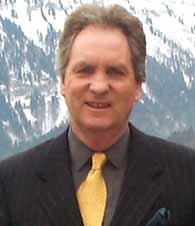|
Executive Interviews: Interview with Michael Hopkins on Corporate Social Responsibility
September 2007
-
By Dr. Nagendra V Chowdary
 Dr. Michael Hopkins
Dr. Michael Hopkins CEO and Chairman of MHC International Ltd. (London & Geneva). He is a part-time Professor of Corporate Responsibilty Business Performance (VRBP) at Middlesex University Business School Visitng Professor at Brunel and Geneva Universities. 
The
work of the UNDP was impressive
but I was concerned that it was a
drop in the ocean and that underdevelopment
was persistent.
Remember, too, it was a few years
after the fall of the Berlin wall and
the collapse of communism. The
private sector was to be given its
head with the score Communism 0,
Capitalism 1. I wondered as I walked
whether the private sector could be
the key to resolving the problem of
under-development. If so, how could
that be promoted? It occurred to me
that a powerful signal could be had
by ranking the major companies
from 1 to 500 following the UNDP
Human Development Index and
using data for the Fortune 500
companies. As I started to research
that idea, I found that data on the
social activities of companies were
almost non existent and so I had to
abandon the idea of ranking the
Fortune 500. I didn't give up and,
instead, turned my attention to
ranking the top companies in the UK.
A year of research led me to discover
the issue of what I called at the time
"socially responsible enterprises"
and to the publication of my first
book on Corporate Social
Responsibility (CSR) The Planetary Bargain: CSR Comes of Age
(Macmillan, UK, 1999). My CSR
journey had started.
-
Can you tell us briefly about MHC
International Ltd (MHCi)
I set up MH Consulting (MHC) when
I left the ILO in 1988. I had enjoyed
my time at the ILO as a researcher in
the World Employment Program but
I wanted to test myself outside the
confines of a highly hierarchical
organization that had started,
surprisingly, to stifle creativity and
ideas. In particular, my manpower
planning model, MACBETH, was
considered unimportant by the ILO. I
therefore left and started to further
develop the software for the model
and sell it as a company MHC. The
company led me into all sorts of
fascinating projects with the World
Bank, EU, the UNDP as noted above,
and the ILO. MACBETH sold well
and I traveled from Vietnam to
Malaysia to Tunisia to China to
Colombia and back again. Later in
the 1990s my brother, Ivor, joined me
as a partner in MHC to focus on the
new area we had been developing CSR. We renamed the company
MHC International (MHCi) to
illustrate our international concerns,
kept our focus on employment and
development issues but also
widened to see whether we could
sell services on CSR to companies.
The former work financed the CSR
work as we started to explore, write,
and lecture on CSR. We feel that
with CSR we were, involved in each
of the three phases of CSR
innovator, diffuser and
implementer and certainly in that
order as the implementation phase
only started to flow our way during
the past three years or so. Today we
at MHCi are very active in a variety of
CSR projects, each different in its
own way, and more is coming our
way mainly in terms of our area of
expertise which, at the risk of
appearing pompous, is innovation
and research advice to companies on
CSR. -
What has been your experience in
having worked with many
companies on their corporate social
responsibility initiatives?
I suppose a business should not
really say this since I guess we ought
to be hard-nosed profit-seekers, but
our main experience has been, in one
word, "enjoyable". We have met
wonderful people in corporations
who are serious and concerned
about the major issues of the day as
well as the role their own companies
play as social organizations and as
economic ones. In each company we
have worked with we have found an
astonishing understanding of the
issues with each one having a varied
approach. There is certainly no one
model fits all. -
Do you think, given the fact that
research on corporate social
responsibility had been widening its
horizons and continues to attract
varied interests in the subject, not
enough has been fructified in actual
practice? If yes, why do you think
there is so much gap between what
the literature advocates and what the
corporates practice?
I actually believe it is the other way
around to how you have put the
question. It depends, too, on what
part of the globe you are talking
about. Corporations, especially in
Europe, are ahead of most University
research departments. European
researchers, and the UK in
particular, tend to aim at research
journals because of the way research
incentives are handled. Business
people rarely read academic
journals. For instance, economists
would read the Journal of Economic Literature or doctors would read the
British Medical Journal. There is no
journal that business people
immediately go to. While in the US,
arguably, the academics are ahead of
the corporates in thinking about
CSR. I don't know so much about
India, it being four times the
population of Europe; anyway it has
a flourishing and highly articulate
publishing arena, whereas its near
neighbor, in size at least, China, is
very different. Probably explained by
one, poorly understood and applied
word, democracy!
1.
Corporate Social Responsibility Case Study
2. ICMR
Case Collection
3.
Case Study Volumes
|
